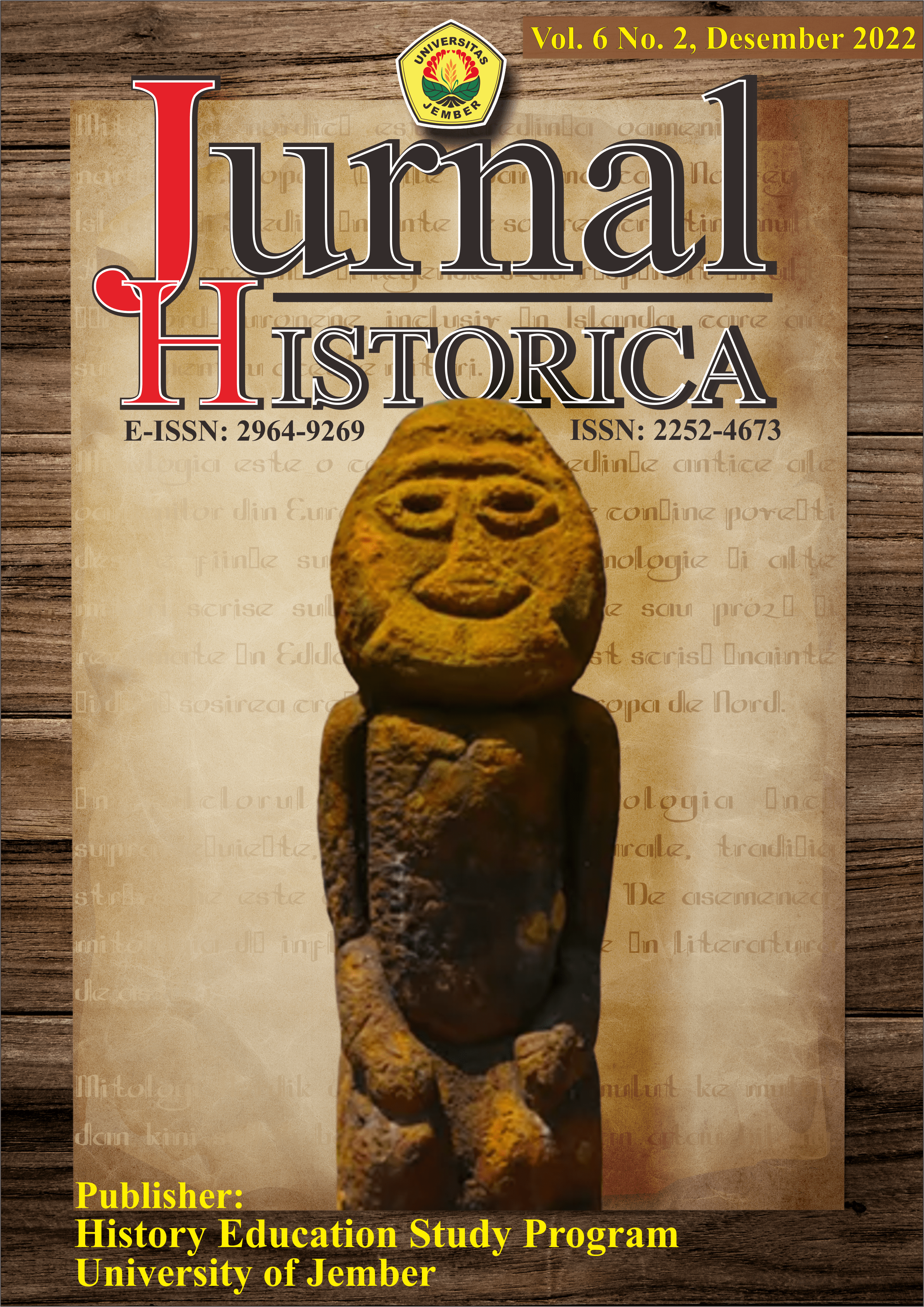Game-Based Learning Models And Improving Student Learning Outcomes In History Subjects
DOI:
https://doi.org/10.19184/jh.v6i2.33677Keywords:
Learning 4.0, game-based learning, student learning outcomesAbstract
This study aims to examine the effect of the application of the game-based learning model on student learning outcomes in historical subjects. This study uses a quantitative approach with the type of experimental research. The research design uses a quasi-experimental model pretest-posttest,, also a non-equivalent control-group design. The sample consists of 66 students in classes XI IPS 4 and XI IPS 1 at SMA Negeri 1 Gambiran. Collect the data using documentation and tests. The data analysis technique uses the one-way ANOVA test and the LSD (Least Significant Different) advanced test software assisted by SPSS 22 for Windows. The results of data analysis show that, there is an effect of the application of the game-based learning model on student learning outcomes in historical subjects. The results of the one-way ANOVA test show that the probability value (sig.) in the experimental group is 0,000<0,05, with the LSD (Least Significant Different) further test of 11.57576. And ANOVA test shows that the probability value (sig.) in the control group is 0,000<0,05, with the LSD (Least Significant Different) further test of 7.48485. Therefore, there is an effect of student learning outcomes in the experimental group that taught using a game-based learning model.
Keywords: Learning 4.0, game-based learning, student learning outcomes
Downloads
References
Anderson, L.W. & Krathwolh, D.R. (2001). A Taxonomy for Learning, Teaching, and Assesing: A Revision of Bloom's Taxonomy of Educational Objectives. New York: David McKay Company.
Cheng, C.H. & Su, C.H. (2011). A Game-Based Learning System for Imroving Student’s Learning Effectiivines in System Analysis Cousce. Journal Procedia-Social and Behavioral Sciences, 31(2012):669-675.
Creswell, John, W. (2009). Research Design: Qualitative, Quantitative, and Mixed Methods Approarches: Third Edition. United States of America: Sage Publications.
Dinc, Emre. (2019). Pandanagan Pendidik Tentang Permasalahan Integrasi Teknologi Dalam Pendidikan. Comtemporary Educational Technology, 10(4):381-398.
Ennis, R. H. (1985). A Logical Basis for Measuring Critical Thinking Skills. USA: University of Illinois.
Erdogan, V. (2019). Mengintegrasikan Keterampilan 4C Abad 21 Kedalam 4 Keterampilan Pada Kelas Bahasa EEL. International Journal of Education and Research, 7(11):113-124.
Fauzan, Rikza. (2019). Pemanfaatan Gamification Kahoot.IT Sebagai Enrichment Kemampuan Berpikir Historis Mahasiswa Pada Mata Kuliah Sejarah Kolonialisme Indonesia. Prosiding Seminar Nasional Pendidikan FKIP, Vol 2(1). Hal 254-262.
Fredriks, J. A. , Blumenfeld, P. & & Alison, P. (2003). School Engagement. Amerika Serikat: Child Trennds.
Gay, L. R. Mills, G.E., & Peter Airasian. (2012). Educational Research: Comptencies for Analysis and Apllications. Tents Editions. Unites States: of America: Pearson Education.
Hankins, O.J.H., (2017). The Impact of Techology Integration on The Engagement Levels of Ten Second Grade Students Inan English Language Art Classroom. Colombia: University of Sount Carolina.
Hussin, A.A.. (2018). Education 4.0 Made Simple: Ideas fofr Teaching. Infernational Journal of Education & Literacy Studies, 6(3): 92-9.
Kelly, T., . (2019). Teaching History in The Digiral Age, Ann Arnor: Auniversity of Michigan Press.
Kendra, Shikssha.(2020). 21st Century Skills: A Handbook. Delhi: Central Board of Secondary Education.
Khoirunnisa, H., Umamah, N., & Sumardi. (2019). Edmodo as a Media for History Learning in The Digital Era. Journal IOP Conf. Series: Earth and Enviromental Science, 243 (012087) doi:10.1088/1755-1315/243/1/01/12087.
King, et al. (2017). Reimagining The Role of Tenchnology in Education. American: Department of Educatioans, Information.
Kolikant, Y. (2019). Adapting School to The Twenty-First Century: Educators’ Perspectives. Journal Technology, Pedagogy and Education. 28(3):287299.
Martin, F. & Boliger, D.U. (2018). Pentingnya Keterlibatan: Persepsi Pesert Didik Tentang Pentingnya Strategi Keterlibatan Dalam Lingkungan Belajar Secara Daring. Online Learning, 22(1):205-222.
McKoy, M.S. & Chung, S.A. (2016). Bacj in The Game: Using Gamification as an Engagemnet Tools With Sapnis Language Learner at Utech, Jamaica.The Journal of Arts Science and Technolog, 9(0):124-144.
Mei, Sou, Y. Ju, S.Y., & Zalika A. (2018). Implementing Quizizz as Game-Based Learning in The Arabic Clasroom. Journal EJSER, 5(1):194-198.
Moore, K., Jones., C. & Roberts, S.F. (2017). Teknik Pendidikan Untuk Generasi Z. American Hournal of Engineering Education, 8(2):111-126.
Newman, F.M. (1992). Student Engagement and Achievemeny in Amarican Secondary Schools. London: Teachers College Press.
Ningsih, S., Umamah, N., & Na’im, M. (2021). Analysis of Prior Knowledge of Educators on Edmodo E-Learning Media and Schoology and its Relationship With Students Critical Thinking Ability. Journal IOP Conf. Series: Earth and Environmental Science. 747 (012032).
Noviyanti, Wenda. (2019). Game Genre Untuk Permainan Pembelajaran Sejarah Berdasarkan Kebutuhan Pedagogi dan Learning Content. Jurnal Politeknik Caltex Riau, 5(2).
Priporas, C. V. Stylos, N. & Anestis, K. F. (2017). Generation Z Consumers’ Expection of Interactions in Smart Retatiling: A Future Agenda. Computers in Human Behavior, 77:374-381.
Romadi, & Kurniawan, G.F. (2017). Pembelajran Sejarah Lokal Berbasis Folklore Untuk Menamkan Nilai Kearifan Lokal Kepada Siswa. Jurnal Sejarah dan Budaya, 11(1):79-94.
Rufaidah, L. N., Umamah N., et al. Learning Environment Technology-based in Improving Students’ Independent Learning. Journal IOP Conf. Series: Earth and Environmental Science, 747 (012056). Doi:10.1088/1755-1315/747/1/012056.
Safitri, D. A., Umamah, N., & Sumardi. (2019). Accelerated Learning Integrated by Discovery Learning in History Course: How Z Generation Learn. Journal IOP Conf. Series: Earth and Enviromental Science, 243 (012151). Doi:10.1088/1755-1315/243/1/01/21/51.
Sani, R.A, et al. (2018). Collaborative Inquiry For 4C Skills. Advances in Social Science, Education and Humanitis Research, 200:440-445.
Sugiyono. (2019). Metode Penelitian Kualitatif Kuantitaif dan R&D. Bandung: Alfabeta.
Umamah, N. (2017). “Pembelajaran Sejarah Kesiapannya Menghadapi Zaman†dalam Kapita Selekta (Pendidikan) Sejarah Indonesia. anggota IKAPI Yogyakarta. 192-201.
Van Laar. E. et al. (2017). The Relation Betweween 21st Century Skills and Digital Skills: a Systematic Literature Review. Computers in Human Behavior, 72:577-588.
Wagner, T. (2010). Overcoming The Global Achievement Gap (online). Cambridge, Mass., Harvard University.
Wang, Yi-Hsuan. (2020). Computers & Education Design-based research on integrating learning technology tools intogihher education classes to achieve active learning. iComputers & Education, 156(May), 103935.
Wiersman, W. & Jurs, S. G. (2009). Research Methods in Education an Introduction. US: Pearson Education, Inc.
Yu, Enjyu & Canton, Suni. (2020). Student-Insprired Optimal Design of Online Learning for Generation Z. Journal of EducatORS Online, 17(1):1-11



